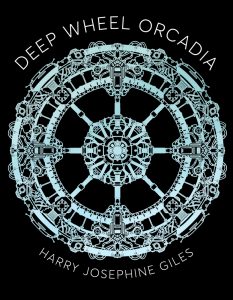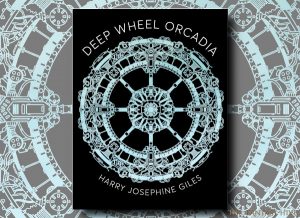DEEP WHEEL ORCADIA by Harry Josephine Giles (BOOK REVIEW)
“An at the pairtners, futurs telt
i’the wey o thir grip: ower closs
or ower lowse or glydan by
wi the aese o binary starns. (Ya, but
thir aye another body coman
on another curve tae mak
a fankelt problem, an best kens
whit way the calculaetions come.)
and at the partners, futures toldwarned in how they hold each other: too close or too loose or gliding by with the ease of binary stars. (Yes, but
there’s always another bodyperson coming on another curve to make a puzzletangled problem, and gods know whathowwherewhy the calculation will come out.)”
Harry Josephine Giles is an acclaimed poet and performer from Orkney, with two award nominated poetry collections to their name. Deep Wheel Orcadia (2021) is a science fiction verse novel written in the Orkney dialect. The poem is technically dazzling, showing Giles’ masterful command of both their chosen dialect and the form of poetry. But it is so much more than an impressive technical exercise. It is a tender queer romance, an exploration of gender and sexuality and how they operate within society, a compelling space opera that draws on the history of Giles’ home in the Orkney Islands. The language is rich and beautiful, rolling off the page, and Giles imbues their characters with depth and humanity. Giles’ book is remarkable, an ambitious melding of language and poetry, speculation and tradition, that creates something beautiful and altogether new.
 Deep Wheel Orcadia is the first full-length work of adult fiction published in the Orkney language for over fifty years. This is a landmark in the history of a minority language in danger of disappearing. However the modern reader need not fear that this will prevent them from understanding the book. The poem is printed in Orkney dialect with the English translation alongside it – as I have quoted above. This allows Giles to make sure that all the nuances and double meanings of the Orkney words are there for the reader to see, so that the reader can enjoy the musicality of Giles’ poetry and the Orkney dialect and not miss out on any of the subtleties.
Deep Wheel Orcadia is the first full-length work of adult fiction published in the Orkney language for over fifty years. This is a landmark in the history of a minority language in danger of disappearing. However the modern reader need not fear that this will prevent them from understanding the book. The poem is printed in Orkney dialect with the English translation alongside it – as I have quoted above. This allows Giles to make sure that all the nuances and double meanings of the Orkney words are there for the reader to see, so that the reader can enjoy the musicality of Giles’ poetry and the Orkney dialect and not miss out on any of the subtleties.
Deep Wheel Orcadia tells the story of the chance meeting and romance between two women. Astrid grew up on the space station Deep Wheel Orcadia, but left to study art on Mars. She has returned looking for inspiration. Darling is a trans woman who has escaped from the restrictive life expected of her from her rich fathers. The two of them meet on Deep Wheel Orcadia and enter into a passionate romance. All this happens against the backdrop of life on the station, which was set up to mine Light around a gas giant, but as the Light depletes and the attention of the rest of the galaxy shifts elsewhere, the way of life the inhabitants have set up for themselves and cherished over generations is under threat. Meanwhile the wreckages of vanished alien civilisations that bring teams of archaeologists to the station may not easily give up their secrets, but something strange is making itself felt across the station.
The poem is told in various different sections, changing in meter, length, tone and rhythm, as Giles adapts the mood of the poem to match the scene they are describing. Across the whole poem, they display a masterful command of language, creating moments of hallucinatory vivid imagery, intimate character interactions, and dramatic space opera sequences with equal aplomb. Giles’ skill at drawing characters and exploring the relationships between them, and their love of the Orkney dialect, means that what could become merely an impressive intellectual exercise never loses its warmth or humanity. The poem features a wide cast of compelling and believable characters, from the central protagonists Astrid and Darling, through to the station’s various inhabitants. There’s Inga and Øyvind, Astrid’s parents, a lightning ship captain and meat technician respectively, Noor the xeno-archaeologist, drawn by the alien wreckages to the station, Eynar, the landlord of a local pub who’s thinking of retiring. Giles brings to life a whole community, built on the way of life shaped by the station and tradition. Whilst Deep Wheel Orcadia operates as a metaphor for the Orkney Islands and their disappearing way of life, the story also functions as exciting space opera, and the themes of conflict between generations driven by decisions to stay and respect traditions or to forge new ways of life are universal.
At the centre of Deep Wheel Orcadia is the romance between Astrid and Darling, which is handled with a wonderful sensitivity. Astrid and Darling are two young people who have come to two very different crossroads in their own lives, who instantly fall for each other but have the same difficulties communicating that everyday people do. Will their love be able to weather the drastic changes coming to the station? Giles explores how Astrid and Darling both need very different things from each other at this stage in their lives, and the poem follows their attempts to overcome these difficulties. They are adept at capturing the heady rush of infatuation and early love, as well as the frustration of being unable to communicate with someone you care deeply about and the pain of people moving in different directions. Deep Wheel Orcadia is a thoroughly unusual prospect, but it’s a fantastic example of how poetry can enrich genre fiction, and Giles is clearly a hugely talented poet at the peak of their powers. It is a bold experiment which more than pays off.

